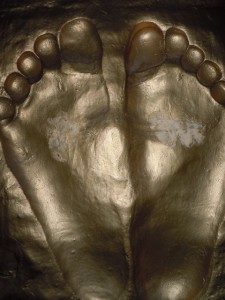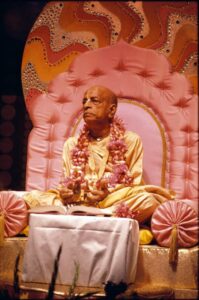All glories to Prabhupada
I am pretty sure most of us on this link dont care or know much about rasa bhasa-so if you are at all even remotely interested in this complex subject matter, here is what Srila Prabhupada writes in his Nectar of Devotion…
please see the very end of this as well-if you want to skip down thru it…
There is a rock group called guns and roses-this would also aptly be called Rasa bhasa.
Damaghosa das
———————
Here is the overall definition:
NoD 45 Laughing Ecstasy
In the fourth division of Bhakti-rasamrta-sindhu, Srila Rupa Gosvami has described seven kinds of indirect ecstasies of devotional service, known as laughing, astonishment, chivalry, compassion, anger, dread and ghastliness. In this portion, Srila Rupa Gosvami further describes these ecstasies of devotional feelings, some being compatible and others incompatible with one another. When one kind of ecstatic devotional service overlaps with another in a conflicting way, this state of affairs is called rasabhasa, or a perverted presentation of mellows.
In the fourth division of Bhakti-rasamrta-sindhu, Srila Rupa Gosvami has described seven kinds of indirect ecstasies of devotional service, known as laughing, astonishment, chivalry, compassion, anger, dread and ghastliness. In this portion, Srila Rupa Gosvami further describes these ecstasies of devotional feelings, some being compatible and others incompatible with one another. When one kind of ecstatic devotional service overlaps with another in a conflicting way, this state of affairs is called rasabhasa, or a perverted presentation of mellows.
As already described, there are twelve different kinds of rasas, or ecstatic relationships which are shared with Krsna. Five of these rasas are direct, and they are listed as neutrality, servitude, fraternal love, parental love and conjugal love. Seven of the rasas are indirect, and they are listed as humor, astonishment, chivalry, compassion, anger, dread and ghastliness. The five direct rasas are eternally manifested in the Vaikuntha world, the spiritual kingdom, whereas the seven indirect rasas are eternally manifesting and unmanifesting in Gokula Vrndavana, where Krsna displays His transcendental pastimes in the material world.
Very often, in addition to one’s regular rasa, there is found the presence of some other rasa, and the mixture of these loving humors is sometimes compatible, or palatable, and sometimes incompatible, or unpalatable. The following is a scientific analysis of the compatibility and incompatibility of the mixtures of these various rasas, or loving moods.
When in the rasa of neutral love (santa-rasa) there are found traces of ghastliness or astonishment, the result is compatible. When with this neutral love there are manifestations of conjugal love, chivalry, anger or dread, the result is incompatible.
When in the ecstasy of a serving humor there are manifestations of dread, neutral love or chivalry (such as dharma-vira and dana-vira), the result is compatible. The ecstasy of devotional service in chivalry (yuddha-vira) and anger are directly produced by Krsna Himself.
With the ecstasy of fraternal love a mixture of conjugal love, laughter or chivalry is highly compatible. With the same fraternal love, a mixture of dread or parental love is most incompatible.
Although there are gulfs of differences between them, with the ecstasy of parental affection a mixture of laughter, compassion or dread is compatible.
With the ecstasy of parental love a mixture of conjugal love, chivalry or anger is incompatible.
With the ecstasy of devotion in conjugal love a mixture of laughter or fraternity is compatible.
According to certain expert opinions, in the ecstasy of conjugal love the feelings of chivalry known as yuddha-vira and dharma-vira are the only compatible additions. According to this view, except for these two humors, all other manifestations are taken as incompatible with conjugal love.
With the ecstasy of devotional laughter a mixture of dread, conjugal love or parental love is compatible, whereas a mixture of compassion or ghastliness is incompatible.
With the ecstasy of devotion in astonishment a mixture of chivalry or neutral love is compatible, whereas a mixture of anger or dread is always incompatible.
With the ecstasy of devotional chivalry a mixture of astonishment, laughter or servitude is compatible, whereas a mixture of dread or conjugal love is incompatible. According to some expert opinions, the ecstasy of neutral love is always compatible with devotional service in chivalry.
With the ecstasy of compassion in devotional service a mixture of anger or parental love is compatible, whereas a mixture of laughter, conjugal love or astonishment is always incompatible.
With the ecstasy of anger in devotional service a mixture of compassion or chivalry is compatible, whereas a mixture of laughter, conjugal union or dread is completely incompatible.
With the ecstasy of dread in devotional service a mixture of ghastliness or compassion is compatible.
With the ecstasy of chivalry in devotional service a mixture of conjugal union, laughter or anger is always incompatible.
In the ecstasy of ghastliness in devotional service, feelings of neutral love, laughter or servitude are compatible, whereas feelings of conjugal union and fraternity are incompatible.
The above analysis is a sample of the study of rasabhasa, or incompatible mixing of rasas. This transcendental science of rasabhasa can thoroughly explain the humors in ecstatic love which are compatible and incompatible with one another. When Lord Caitanya Mahaprabhu was residing in Jagannatha Puri, many poets and devotees used to come to Him and offer their different kinds of poetry, but the regulation was that Lord Caitanya’s secretary, Svarupa Damodara, first examined all of these writings scrutinizingly, and if he would find that there were no incompatibilities in the rasas, or transcendental mellows, he would then allow the poet to approach Lord Caitanya and recite his poetry.
The topic of incompatibility is a very important one, and those who are pure devotees always expect to find perfect compatibility in descriptions of the different relationships with the Personality of Godhead. The study of compatibility and incompatibility sometimes becomes very involved, and a hint of why this is so is given as follows. When a friend meets another friend, the mellow produced out of that meeting is generally taken as very palatable. But actually with such meetings between two friends, there are so many feelings involved that it is difficult to ascertain when these feelings are actually becoming compatible and when they are becoming incompatible.
Expert literary scholars have analyzed the rasas which are compatible with one another by contrasting the various rasas in a particular mixture under the names whole and part. According to this method, the prominent feeling is called the whole, and the subordinate feeling is called the part.
With the ecstasy of devotion in astonishment a mixture of chivalry or neutral love is compatible, whereas a mixture of anger or dread is always incompatible.
With the ecstasy of devotional chivalry a mixture of astonishment, laughter or servitude is compatible, whereas a mixture of dread or conjugal love is incompatible. According to some expert opinions, the ecstasy of neutral love is always compatible with devotional service in chivalry.
With the ecstasy of compassion in devotional service a mixture of anger or parental love is compatible, whereas a mixture of laughter, conjugal love or astonishment is always incompatible.
With the ecstasy of anger in devotional service a mixture of compassion or chivalry is compatible, whereas a mixture of laughter, conjugal union or dread is completely incompatible.
With the ecstasy of dread in devotional service a mixture of ghastliness or compassion is compatible.
With the ecstasy of chivalry in devotional service a mixture of conjugal union, laughter or anger is always incompatible.
In the ecstasy of ghastliness in devotional service, feelings of neutral love, laughter or servitude are compatible, whereas feelings of conjugal union and fraternity are incompatible.
The above analysis is a sample of the study of rasabhasa, or incompatible mixing of rasas. This transcendental science of rasabhasa can thoroughly explain the humors in ecstatic love which are compatible and incompatible with one another. When Lord Caitanya Mahaprabhu was residing in Jagannatha Puri, many poets and devotees used to come to Him and offer their different kinds of poetry, but the regulation was that Lord Caitanya’s secretary, Svarupa Damodara, first examined all of these writings scrutinizingly, and if he would find that there were no incompatibilities in the rasas, or transcendental mellows, he would then allow the poet to approach Lord Caitanya and recite his poetry.
The topic of incompatibility is a very important one, and those who are pure devotees always expect to find perfect compatibility in descriptions of the different relationships with the Personality of Godhead. The study of compatibility and incompatibility sometimes becomes very involved, and a hint of why this is so is given as follows. When a friend meets another friend, the mellow produced out of that meeting is generally taken as very palatable. But actually with such meetings between two friends, there are so many feelings involved that it is difficult to ascertain when these feelings are actually becoming compatible and when they are becoming incompatible.
Expert literary scholars have analyzed the rasas which are compatible with one another by contrasting the various rasas in a particular mixture under the names whole and part. According to this method, the prominent feeling is called the whole, and the subordinate feeling is called the part.


